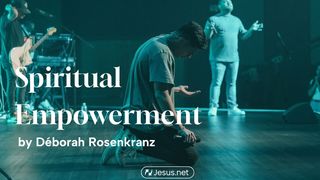Plan Info
GLEANINGS - LeviticusSample

What is the meaning and significance of the burnt offering?
It's made very clear from the beginning of the Book of Leviticus that we cannot come close to God without an atoning sacrifice, because we are sinful. We cannot make it on our own and therefore, He Himself provides the way.
The burnt offering was really the backbone of the entire sacrificial system of ancient Israel. It was offered every day in the morning and the evening, with additional burnt offerings being made on the Sabbath, the first day of the month, and many of Israel’s yearly feasts.
The word translated as “burnt offering” is the Hebrew word ʻôlâh or ʻôwlâh (pronounced o-law’). It literally means a step or (collectively, stairs, as ascending); usually a holocaust (as going up in smoke). This sacrifice went up to God as a step.
A good way of thinking about the ʻôlâh is to think about the ladder in Jacob’s dream (Genesis 28:12-13). The burnt sacrifice made atonement for sin so that there was a renewed connection between God and man. The burnt offering is so-called because it was completely destroyed on the altar.
The purpose of the burnt offering was to make atonement for the sin of the offeror and thus to gain God’s acceptance.
The burnt offering has four distinctive characteristics that set it apart from all others. To glean the most from it, it is essential that we remember that these characteristics all describe the same person but from different perspectives, much as the gospel accounts present four views of Christ, or as one would turn a piece of art or craftsmanship to inspect it from different angles. With each little turn, the viewer picks up a new feature that pleases or instructs.
The four distinctive characteristics are:
1. It is a sweet savor to God, given not because of sin but out of sincere and heartfelt devotion.
2. It is offered for acceptance in the stead of the offeror. The animal represents the offeror.
3. A life is given, representing total devotion in every area of life.
4. It is completely burned up, also representing total devotion but from a different angle: that it was truly carried out.
Jesus Christ is described as the one who reconciles us to God through his offering up of himself. The burnt offering was a soothing aroma in Yahweh’s nostrils, so too Jesus “gave himself up for us, a fragrant offering and sacrifice to God.” (Eph. 5:2) Just as the animal for the burnt offering was required to be blameless, or without any blemish (Lev. 1:3), Jesus is described the lamb without blemish or spot (1 Pet. 1:19) who has redeemed us by his precious blood.
The burnt offering is in one sense the most "complete" of all the sacrifices offered to God. In every other type of offering, only a small portion is burnt on the altar. But the burnt offering is to be entirely consumed by flame, as a "sweet aroma to the Lord" (Leviticus 1:9, 13, 17).
The death of Jesus, the perfect Lamb of God, negated our need for burnt sacrifices. Instead, we’re told that we should be living sacrifices (Romans 12:1-2). Since God lives in us in the person of the Holy Spirit, we are His temple. It is our lives that go up to heaven as sweet savors and not the scent of burnt animals.
Application Questions:
How does this chapter impact what types of voluntary offerings you bring to the Lord? What is necessary for the Lord to accept our offerings as a sweet smelling aroma?
Quote:
When God becomes a Man and lives as a creature among His own creatures in Palestine, then indeed His life is one of supreme self-sacrifice and leads to Calvary. - C.S. Lewis
Prayer:
Lord, I thank You for Your perfect sacrifice for my sins. Help me to give my life as a living sacrifice to You today. Amen.
Scripture
About this Plan

GLEANINGS is a one-year devotional through the Bible. Leviticus begins where Exodus left off. No sooner did the glory cloud come down to rest on the tabernacle in the concluding verses of Exodus, than God instructed Mose...
More
We would like to thank Vijay Thangiah for providing this plan. For more information, please visit: https://www.facebook.com/ThangiahVijay/









